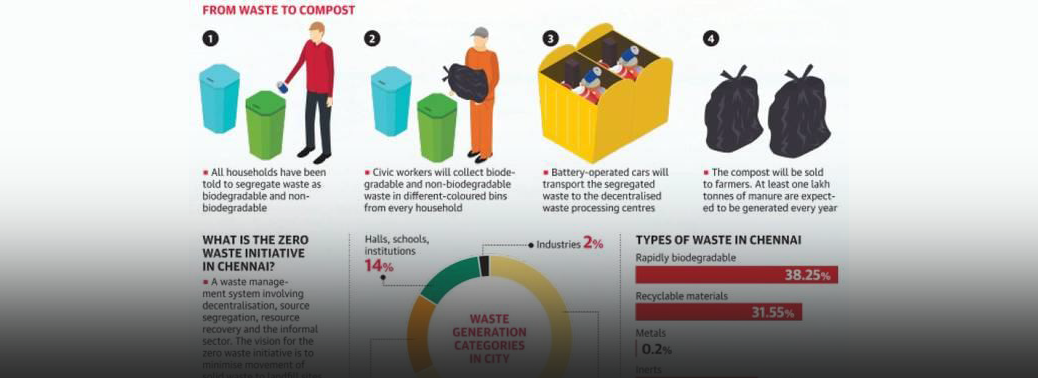ZERO WASTE CHENNAI INITIATIVE KICKS OFF
27, May 2019

Prelims level : Environment
Mains level : GS-III Technology, Environment, Economic Development
Why in News:
- A major initiative towards Zero Waste Chennai has begun in Anna Nagar.
Background: / Vision:
- The vision for the Zero Waste initiative is to minimise movement of solid waste to landfill sites.
- As far as possible, waste should be processed and converted in-situ at decentralised composting or organic waste processing unit or sent to specialised scientific disposal centres.
- The plan is to create a live zero-waste model that could be replicated across the city.
Partner:
- The Greater Chennai Corporation has entered into an MoU with the Citizen Consumer and Civic Action Group (CAG), which will play the role of a knowledge partner.
Campaign:
- During the campaign, Corporation staff, such as animators, conservancy workers, engineers and senior officials, will display a chart explaining the role and responsibilities of residents. They will then get them to sign a pledge indicating their commitment to source segregation and composting.
Solid Waste Mangement:
- Solid Waste Management: It is a term that is used to refer to the process of collecting and treating solid wastes. It also includes solutions for recycling items that do not belong to garbage or trash.
- The Rules are applicable beyond Municipal areas and extend to urban agglomerations, census towns, notified industrial townships, areas under the control of Indian Railways, airports, airbase, Port and harbour, defence establishments, special economic zones, State and Central government organizations, places of pilgrims, religious & historical importance.
- The source segregation of waste has been mandated to channelize the waste to wealth by recovery, reuse and recycle.
- Responsibilities of Generators have been introduced to segregate waste into three streams: Wet (Biodegradable),
Dry (Plastic, Paper, metal, wood, etc.) and - Domestic hazardous wastes (diapers, napkins, empty containers of cleaning agents, mosquito repellents, etc.)
- Segregated wastes should be handed over to authorized rag-pickers or waste collectors or local bodies.
- Integration of waste pickers/ rag pickers and waste dealers in the formal system. This is to be done by State Governments, and Self-Help Group, or any other group to be formed.
- Generator will have to pay ‘User Fee’ to waste collector and for ‘Spot Fine’ for Littering and
Non-segregation.






